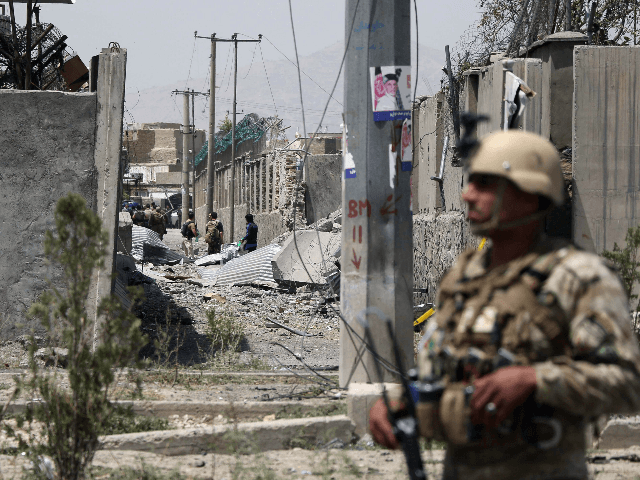The Taliban on Tuesday vowed to continue fighting in Afghanistan, saying U.S. President Donald Trump would “regret” declaring peace negotiations are over with the terrorist group.
“We had two ways to end the occupation in Afghanistan, one was fighting, the other was talks and negotiations,” Zabihullah Mujahid, a Taliban spokesman, told the Agence France-Presse (AFP) news agency.
“If Trump wants to stop talks, we will take the first way, and they will soon regret it,” the spokesman added.
Citing a Taliban attack on September 5, President Trump announced on Saturday that he had canceled a secret meeting with Taliban negotiators at the U.S.-based Camp David.
Taliban jihadis killed ten people in the attack, including two NATO service members from the United States and Romania.
The assault came days after the top U.S. peace negotiator, Zalmay Khalilzad, proclaimed that nearly a year of peace negotiations with the Taliban had yielded a deal “in principle.”
In announcing the end to peace talks, Trump accused the Taliban of using terror to strengthen their position, echoing members of his administration.
Via Twitter on Saturday, Trump declared that the Taliban was trying to “build false leverage” in the peace talks.
He added, “What kind of people would kill so many in order to seemingly strengthen their bargaining position? They didn’t, they only made it worse!”
Unbeknownst to almost everyone, the major Taliban leaders and, separately, the President of Afghanistan, were going to secretly meet with me at Camp David on Sunday. They were coming to the United States tonight. Unfortunately, in order to build false leverage, they admitted to..
— Donald J. Trump (@realDonaldTrump) September 7, 2019
On Monday, Trump reiterated that the negotiations were over.
“They’re dead as far as I’m concerned,” Trump told reporters.
“We’ve hit the Taliban harder in the last four days than they’ve been hit in over ten years,” he acknowledged, adding, “We’d like to get out, but we’ll get out at the right time.”
U.S airstrikes on the Taliban and other jihadis in Afghanistan have reached unprecedented levels. Nevertheless, the war “remains at a stalemate,” a top U.S. watchdog agency reported last month.
Trump has made no secret of his desire to pull U.S. troops out of Afghanistan.
Last month, however, the president conceded that there would be no complete withdrawal of American forces from Afghanistan, saying the United States would “always” have to keep an eye on the Taliban.
The Taliban issued a statement soon after Trump’s tweet canceling the talks, stressing that the U.S. president’s decision will lead to more death.
On Saturday, the Taliban stated:
As [the] president of the United States has announced [the] suspension of negotiations with the Islamic Emirate [Taliban], this will harm America more than anyone else. It will damage its reputation, unmask its anti-peace policy to the world, even more, increase its loss of life and treasure and present its political interactions as erratic.
…
Such a reaction towards a single attack just before the signing of an agreement displays lack of composure and experience.
…
Our previous eighteen-year resistance should have proven to America that we will accept nothing less than the complete end of occupation and allowing Afghans to decide their own fate. And we shall continue our Jihad for this great cause and maintain our strong belief in ultimate victory, Allah willing.
Taliban jihadis intensified their attacks amid the peace negotiations.
The meeting at Camp David between the U.S. president and the Taliban narco-terrorist group would have taken place last Sunday, days before the 18th anniversary of the 9/11 attacks on the American homeland.
U.S. troops invaded Afghanistan in October 2001 to remove the Taliban regime for harboring the late al-Qaeda leader Osama bin Laden and his supporters before the September 11 massacre.
In Afghanistan, the U.S. military is also fighting to prevent the South Asian country from becoming a haven for jihadis seeking to attack the United States.
Acknowledging that a military victory is unattainable at this juncture, the Trump administration deemed the peace negotiations the primary tenet of its strategy to end the nearly 18-year-old war in Afghanistan.
Under a peace deal, the U.S. would have withdrawn its troops mainly in exchange for Taliban assurances that it will not allow Afghanistan to become a haven for terrorist groups like al-Qaeda and the Islamic State (ISIS/ISIL).
Taliban jihadis were expected to renounce their ties to al-Qaeda publicly, U.S. Secretary of State Mike Pompeo said over the weekend during Fox News Sunday.
While the Taliban considers ISIS an enemy, the group remains tight with al-Qaeda, the Pentagon acknowledged in July.
The U.S. also expected the Taliban to engage in ceasefire negotiations with Afghan President Ashraf Ghani’s administration after the signing of the peace pact. Taliban jihadis maintain that they will only negotiate with Kabul after the full withdrawal of U.S. troops.
The Taliban, which is fighting to establish a sharia-compliant Islamic emirate, considers itself the only legitimate government of Afghanistan, dismissing the Ghani administration as U.S. “puppets.”

COMMENTS
Please let us know if you're having issues with commenting.